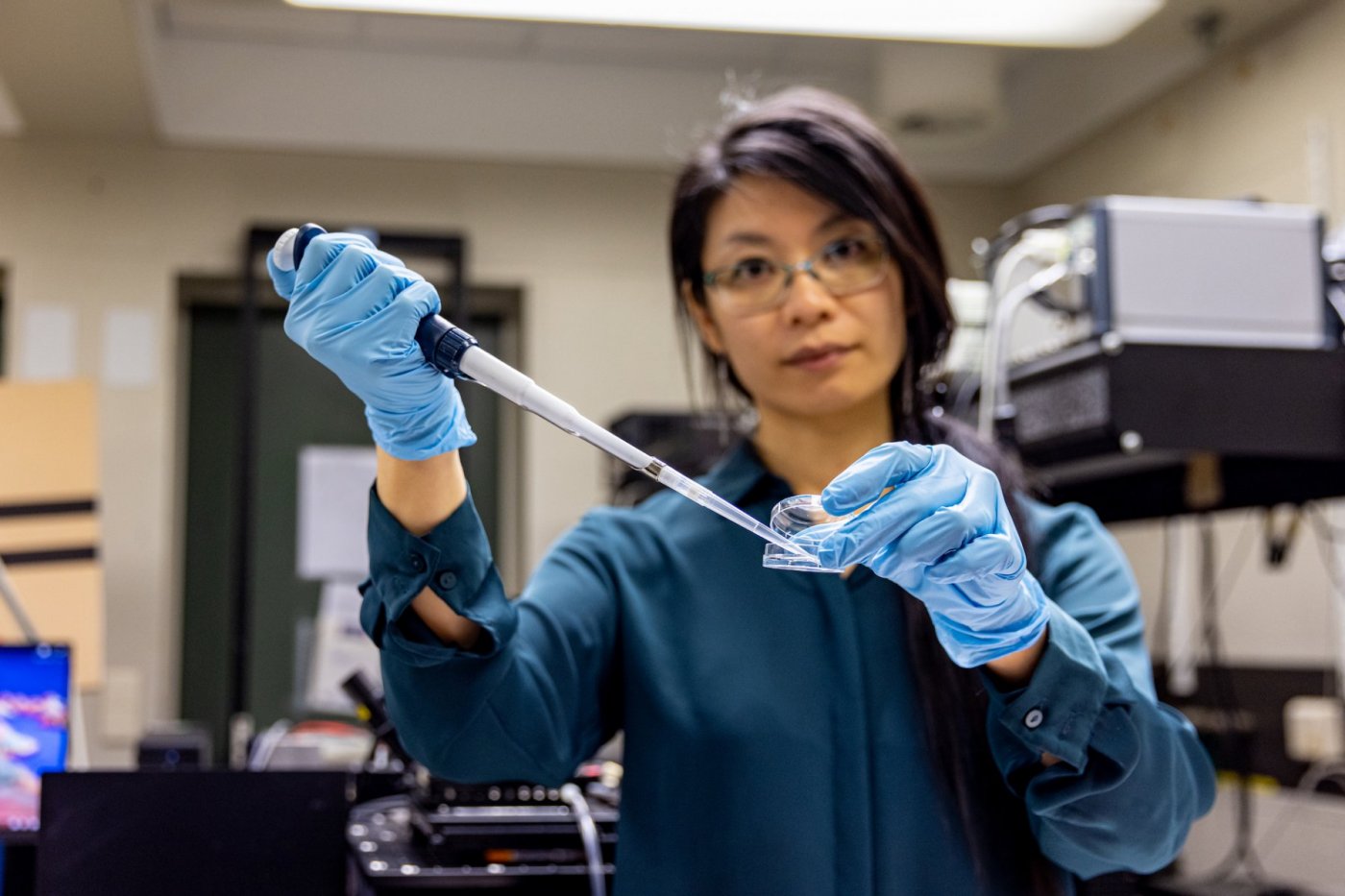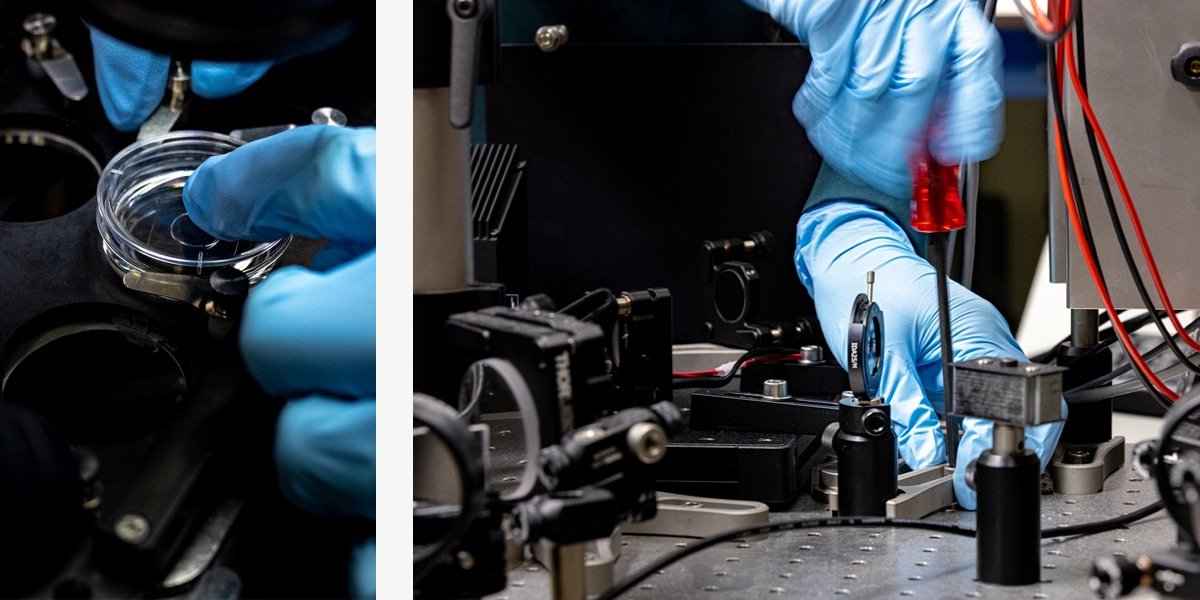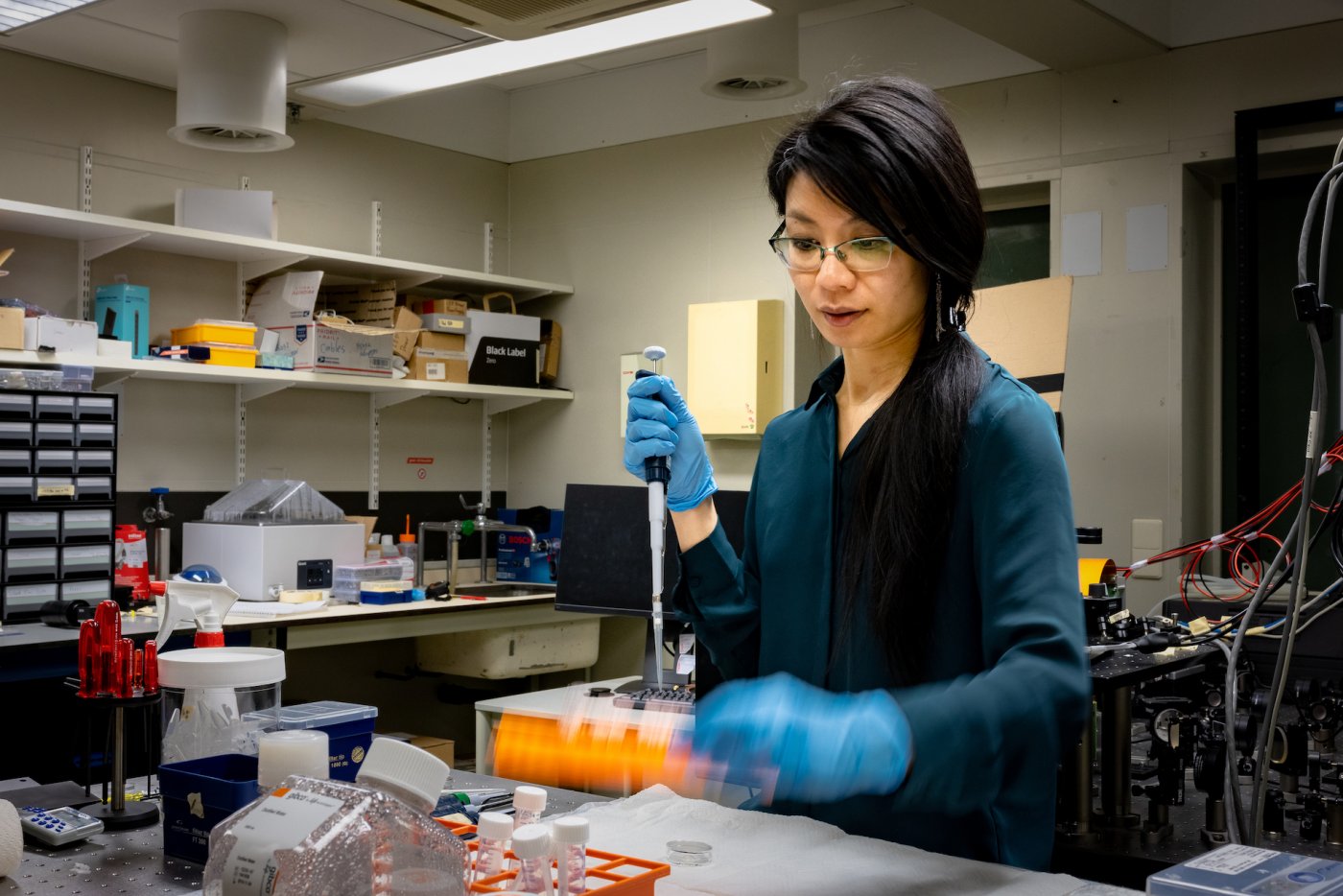A jack of all trades, the saying goes, is a master of none. Miao-Ping Chien certainly puts the lie to that. She graduated in biomedical sciences in Taiwan, got a PhD in chemistry and biochemistry in San Diego, and combined optical engineering and computational biology in her postdoctoral work at Harvard.
Now, four years after starting her own research group at Erasmus MC and part of Oncode Institute, she and her group have devised and built an optical microscope that can pinpoint exactly which cancer cells to target with cures. In the near future, her invention should be spun out for commercialization into a company called UFO Biosciences. This is a scientist who deliberately chooses to be multidisciplinary and is as determined to spin out more companies as she is devoted to science. “It should be common”, Chien argues, “for scientists to be entrepreneurs and to give them every support” to have an impact.
Putting science to use
When Chien was a younger scientist, like other scientists she cared about things like how many publications you have and how often they are cited. But that changed. Increasingly, she wanted to develop something and get it used. That implied broadening her outlook and her expertise to more than one discipline. “It is because you are active in different fields”, argues Chien, that you can “see the bigger picture and think of applications”. Basic, fundamental research is crucially important – “that is what you build on” – but you “also want people to think about the potential, the larger impact of their discoveries”. When developing methods, mechanisms, markers, etcetera, it’s good practice for researchers to think about how we can apply that to people as well.
To bring discoveries or technologies closer to practice, advance their ‘technology readiness level’ – in other words: to get people to use it – you need a company. And building a company is not just multidisciplinary. It also takes a lot of help. Chien’s soon-to-be spun-out company UFO Biosciences (short for Ultrawide Field-of-view Optical microscope) provides an instructive example.
Finding cancer and finding support
Cancer, she explains, is not homogeneous. Tumors consist of different cells. Some are more aggressive and cause metastasis (spread to different parts of the body) and/or are resistant to treatment. Chien has combined technologies – from optical microscopy to image processing, genetic engineering, single-cell sequencing, and photochemistry – to develop tools that can find these problematic cells, isolate them, sequence their DNA/RNA/protein, and analyze what makes them malignant to provide starting points for developing cures.
The potential impact is as enormous as it is obvious but there are various ways to deliver it. You could sell the machines and teach others how to use them. You can provide a service, use the machines and methodology for others. Ultimately, you could also use them in your own drug discovery. With the help of the Erasmus MC technology transfer office (TTO) and Oncode Institute, Chien decided to start as a service company and possibly expand into diagnosis, target and drug discovery later.
“I have been very lucky”, says Chien, “in the support I’ve found”. It started, crucially, with her department head. He provided funding to build the microscope, found her some resources, and allowed her time to work on the spinout. That is not standard practice, she stresses. Some researchers in other departments and institutes might not be as fortunate. Next, she got support from the TTO. Again, she was lucky.
Erasmus being a medical center, “they are not used to spin out this type of technology, so it takes a bit longer”. But they were committed to helping it happen and Chien got a senior person at TTO who was very helpful. Finally, she was supported by Oncode, an institute specifically set up to make the valorization of cancer research as excellent as the research itself. “The model works”, Chien confirms. “Their people are experienced and professional.” Oncode has a much higher ratio of business developers to scientists than a traditional research institution, let alone a university, can have. They are specialists and can mobilize the right resources. “They taught me a lot”.
As Chien’s example shows, the support is there but it is still often a matter of luck and encountering the right people. “I do see things changing”, says Chien, but it is not yet common.
Miao-Ping Chien joined Erasmus Medical Center as a group leader in 2017. The Chien Lab is also part of Oncode Institute. Miao graduated in biomedical sciences in Taiwan and obtained her PhD in (bio)chemistry from the University of California, San Diego in 2013. She went on to postdoctoral work at Harvard University, combining biophysics, computational biology and optical instrumentation. During her PhD and postdoctoral research, Miao received prestigious awards, such as the Life Science Research Foundation & Gordon and Betty Moore postdoc fellowship, Inamori Award and Martin Kamen Prize.
Miao’s current research focuses on developing and applying multidisciplinary technologies (advanced microscopy and imaging, computation, bioinformatics, (photo)chemistry) to investigate the underlying mechanisms of tumorigenesis, particularly as related to therapy-resistant cancer stem-like cells. As a principal investigator, she continued to win awards and grants, including among others NWO Veni grant, CancerGenomiCs.nl (CGC) Junior Fellowship, Oncode Institute Junior Fellowship, EMC Fellowship, Convergence grant and the Ammodo Science Award.
Miao-Ping Chien co-founded UFO Biosciences, which aims to enable better cancer care by creating treatment options for rare, cancer-driving cell populations that escape traditional treatment.

“It should be common for scientists to be entrepreneurs and to give them every support”
A new normal?
So, what would be needed to change this? What would help scientist-entrepreneurs? Three things, Chien reckons: the vibe, physical support, and national policy. First of all, it is important to have an environment in which it is not weird to be both a scientist and an entrepreneur. Look at San Diego and Boston, places Chien got to know well. There it is normal to be a professor and have your own company. It is expected and encouraged. Kendall Square, next to MIT, has been called the most innovative square mile on Earth and is home to hundreds of start-ups. It offers an environment for people to meet, low price offices, labs to use. “The whole vibe is just so inviting”, says Chien. It is completely natural to try, fail, learn and try again. Everybody does it. “In the end, the whole area gains” in a loop of positive reinforcement: more people come, more is invented, more companies base there, etcetera. That is the vibe we need.
Her time in the US also made it natural for Chien to reach out to her TTO. “I knew the route”. A would-be scientist-entrepreneur needs what Chien calls “physical support”. Help to choose the right model for their business, communicate with their institute and negotiate conditions to use IP, talk to investors, find a CEO, etcetera. The Erasmus MC TTO has an “Entrepreneurship Awakening Programme” with lots of external experts. Participation is free and the program is supported by the board. Another important enabler is the availability of affordable facilities, such as office space, labs, machines, and technical support. Ideally, they should be free – for start-ups have little money before the first serious investment round and the focus should not be on rent but on (societal) returns.

"What would be needed to change this? The vibe, physical support, and national policy."
Government has a decisive role here. It can create the conditions that stimulate universities to help out. It can also offer support in mobilizing the funding, especially for very early stages of development, that in the US is so much more readily available in so much larger amounts. It can also provide more funding for basic research so that our best scientists spend less time writing grant applications and more time thinking about the practical applications of their research.
Chien is optimistic. You would not expect different from an entrepreneur, but she also genuinely sees change happening. If we are not there yet, it is not unwillingness that’s holding us back. Changing the system, nationwide, simply takes time. The US started decades ago, but if we continue on the course we are on, maybe pick up the pace, it will not take us decades to catch up and get that same vibe here – that for a scientist to be an entrepreneur is nothing more than business as usual.
Three takeaways for further contemplation and discussion:
- What could be done to make it natural for a scientist to have/start their own company (or more than one) next to or as an extension of their research?
- Should we expect/encourage multi-disciplinarity in more or most of our scientists to conceive more and better applications?
- Could/should the government free more time and energy for valorization by providing more free funding for basic research?
Read the interviews with other entrepreneurial scientists here
